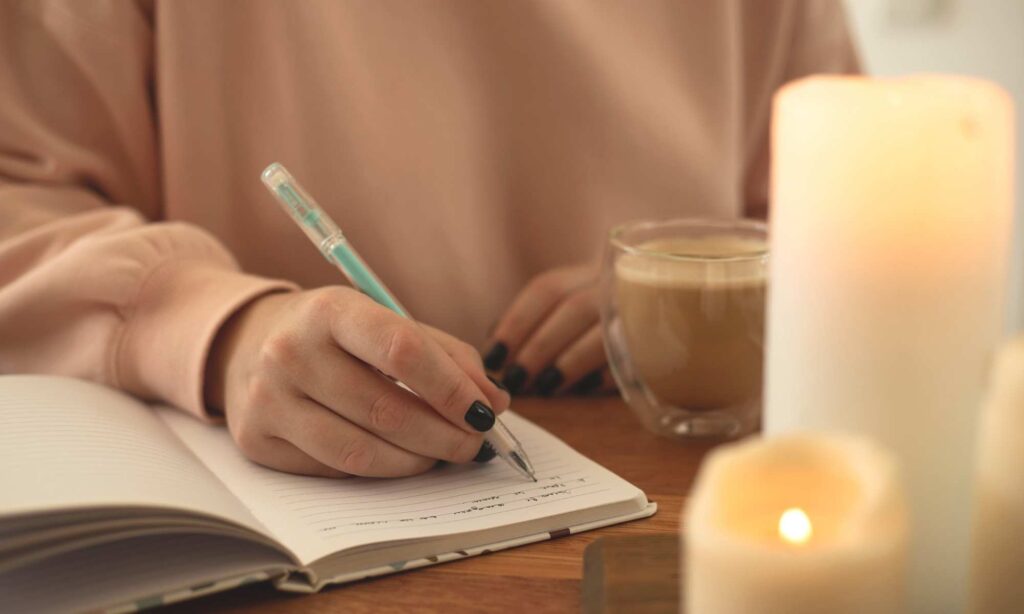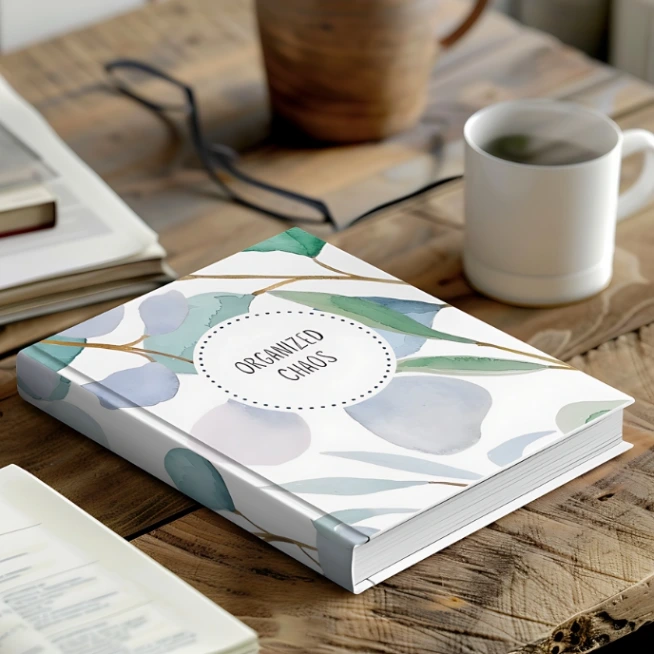The Wake-Up Call You Need: How Self-Accountability Transforms Everything

Table of Contents
There’s a hard truth most of us avoid, and yet it holds the secret to everything we want in life:
No one is coming to save you.
Not a coach. Not a partner. Not a perfectly colour-coded planner. Not a new app, a fresh morning routine, or even your therapist. Not even me with this blog.
That may sound harsh – but it’s actually the most freeing truth you’ll ever learn.
Because once you stop waiting for someone to fix your life, you realise the only person who can truly change it… is you.
And that’s the good news.
Your growth, your healing, your dreams – they’re all within your reach. But they require one thing above all: self-accountability.
In this article, you’ll learn what self-accountability really means, why it’s essential for personal growth, and how to start taking ownership of your life with practical tools, daily actions, and journal prompts that will help you move from stuck to unstoppable.
The Wake-Up Call: Waiting Is the Trap
Let’s be honest. Most of us spend a lot of time waiting.
- Waiting for motivation
- Waiting for the perfect plan
- Waiting for a sign, a mentor, or a magic moment
- Waiting for someone else to solve problems for us
But here’s what really happens while we wait:
- We buy the journal and never write in it.
- We follow inspirational pages and still feel stuck.
- We swear “this Monday is different” for the fifth time.
We get addicted to starting over, hoping someone or something will finally light the fire inside us.
Here’s the truth: You are the fire.
Everything you’re hoping someone else will bring to your life – discipline, clarity, direction, momentum – already lives within you.
The minute you stop outsourcing your power and start embracing self-accountability, everything changes.

What Is Self-Accountability – and Why Does It Matter?
Self-accountability means owning your choices, your time, your emotions, and your goals – without blaming others or waiting for outside forces to drive you.
It’s the moment you stop pointing fingers and start building your future from the inside out.
It doesn’t mean being hard on yourself. It doesn’t mean doing everything alone. It means realising:
- You are responsible for your growth.
- You are the creator of your habits and systems.
- You are the one who decides when things begin.
Self-accountability means being honest about where you are, why you’re there, and what you’re willing to do about it. It’s not about shame or perfection – it’s about ownership.
It’s about asking:
- What’s within my control?
- Where have I been waiting, avoiding, or blaming?
- How can I take the next step, no matter how small?
Self-accountability gives you back your power. Instead of hoping someone else will change your circumstances, you take action based on your values, goals, and vision. You stop outsourcing your responsibility. You start owning your results.

Stop Blaming – Start Reflecting
One of the biggest obstacles to self-accountability is blame.
It’s easy to point fingers – at your boss who “just doesn’t get you,” your partner who “never listens,” or your past that “messed everything up.”
But here’s the truth: you can’t change other people – only yourself.
This doesn’t mean excusing poor treatment or minimising your feelings. It means stepping into your own power by choosing reflection over reaction.
Next time you feel frustrated by someone else’s behaviour, grab your journal and look inward. Reflect on the interaction – not just what they did, but how you showed up.
Use these prompts to guide you:
- What exactly triggered me – and why?
- Was I clear and honest about my needs, or did I expect them to read my mind?
- How was my body language and tone of voice?
- Did I speak in a confrontational, defensive, or passive-aggressive way?
- Was this the right moment to bring it up, or was the timing poor?
- Am I expecting them to solve something I need to take responsibility for?
- What boundary can I set that supports both of us moving forward?
- What can I do differently next time to help the situation instead of fuelling it?
You might discover that your boss is actually quite reasonable, and that your tone or assumptions added tension. Or that your partner doesn’t ignore you out of carelessness, but because you tend to talk when they’re mentally or physically drained.
You might even realise that while your past did shape you, it no longer has to control you. It can be the starting point for strength, not a permanent excuse.
Self-reflection builds self-awareness. Self-awareness builds ownership. And ownership opens the door to real, lasting change.
Tools Won’t Save You – But They Can Support You
Planners, journals, habit trackers, meditation apps, vision boards – they’re everywhere. And yes, they can be incredibly helpful. But let’s be clear:
No tool will change your life unless you decide to use it with intention and consistency.
That brand new productivity planner won’t create focus for you. The app won’t build discipline. A motivational quote in your journal won’t magically fix your mindset.
These tools are your sidekicks, not your saviours. They’re here to support your journey – not do the work for you.
So what actually makes the difference?
- Consistency over perfection – You show up even on the bad days, even when it’s hard, even when your motivation is low.
- Commitment over mood – You don’t wait to feel ready or inspired. You honour your decisions, not your fluctuating feelings.
- Courage over comfort – You choose discomfort, uncertainty, and messiness when it means moving forward, instead of hiding in safe patterns.
You can’t download discipline.
You can’t subscribe to self-respect.
You can’t outsource ownership.
But you can start small. You can pick up the planner and actually use it. You can light a candle and open your journal after a long day. You can track one habit, set one intention, and honour one promise to yourself.
When tools meet self-accountability, that’s where real transformation begins.
Daily Actions That Build Radical Self-Accountability
Self-accountability doesn’t show up overnight. It’s something you practise, build, and strengthen over time – with daily, conscious choices.
Here’s a set of real, practical tools you can start using immediately to shift from passive waiting to intentional action:
1. Set a Daily Non-Negotiable
Pick one thing you commit to doing no matter what – a 10-minute walk, journaling before bed, drinking a litre of water. Build momentum with consistency.
2. Track Personal Promises
Keep a mini “self-integrity tracker.” Every time you keep a promise to yourself, check it off. Watch your self-trust grow. You can use a journal like my undated planner for this.
3. Create a Morning Check-In Ritual
Before diving into the day, ask yourself: What matters most today? What’s one way I’ll take responsibility for my energy, focus, or actions?
4. Use the “Stop–Start–Continue” Method Weekly
Reflect on:
- What do I need to stop doing that’s keeping me stuck?
- What can I start doing to move forward?
- What should I continue that’s already working?
5. Identify & Interrupt Your Coping Loops
Notice what you do when you’re avoiding something hard. Endless scrolling? Emotional eating? Call it out – then redirect that energy into one productive step.
6. Schedule “Hard Conversations” With Yourself
Once a week, set a 15-minute timer and write down what you’re avoiding or hiding from. Then ask: What’s the cost of not addressing this?
7. Turn Complaints into Questions
Instead of “My boss doesn’t respect me,” ask: Have I clearly communicated what I need?
How might I be contributing to this dynamic?
8. Audit Your Environment
Is your space aligned with your goals? Clean one drawer, rearrange your desk, delete apps that steal your focus. Small changes equal big shifts.
9. Practice Micro-Boundaries
Say no to just one thing today that doesn’t align with your priorities. Protect your time like it matters – because it does.
10. Ask “What Would the Empowered Me Do Right Now?”
Let that version of you make the next decision. Choose from your future, not your fear.

30-Day Journal Challenge for Radical Self-Accountability
Ready to stop spinning your wheels and start taking full ownership of your life? Self-accountability starts with radical honesty – even when it’s uncomfortable.
Use one prompt each day for the next month. The first half of the challenge focuses on recognising your patterns, stories, and areas where you might be giving away your power. The second half focuses on solutions – defining boundaries, actions, priorities, and systems to help you step into ownership with clarity and intention.
Days 1–15: Awareness & Reflection
- What area of my life currently feels out of alignment, and how is that affecting me?
- What’s one thing I keep avoiding, even though I know it matters?
- When was the last time I broke a promise to myself, and how did that feel?
- Where do I often find myself blaming others for how I feel or where I am?
- What do I typically do when I feel uncomfortable, stressed, or overwhelmed?
- What’s one excuse I often use to justify not taking action?
- How do I usually respond when things don’t go as planned, and what does that say about my mindset?
- What does “taking ownership” mean to me in practical, everyday terms?
- What actions or habits make me feel powerful and in control, and which ones make me feel weak or lost?
- In what ways am I relying on motivation or external pressure instead of building discipline?
- When do I tend to overcommit, and what might I be avoiding by doing so?
- What are three small habits I use to distract myself from what really matters?
- What does it feel like when I’m truly present and intentional, and what helps me get there?
- If I could describe my current level of self-respect in one sentence, what would it be?
- What is one belief I hold about myself that keeps me stuck, and where did it come from?
Days 16–30: Action & Ownership
- What’s one daily non-negotiable I can commit to, and how will I keep track of it?
- What simple promise can I make to myself this week, and how will I honour it?
- What is one thing I need to stop doing because it’s keeping me small?
- What is one thing I should start doing to step into who I want to become?
- What should I continue doing because it supports my goals and wellbeing?
- What does my ideal morning or evening routine look like, and how can I begin building it?
- What does setting a boundary look like in my life this week, and with whom?
- How can I make my environment more supportive of who I want to be?
- What does being consistent (not perfect) mean for me, and what would that look like this month?
- How will I celebrate keeping a commitment to myself, even a small one?
- What is one way I can track my daily effort or progress, even if the results aren’t visible yet?
- What can I do today that my future self will thank me for?
- What am I tolerating right now that is draining my energy, and what’s my next step to shift that?
- What would it look like to show up as my empowered self in one small decision today?
- If I fully owned my power, responsibility, and vision, what would I do differently tomorrow?
Don’t just answer with your head – answer with your gut. Sit in the discomfort. Own it all – the truth, the patterns, the missed chances – because that’s where your freedom begins.
The uncomfortable answers? That’s your starting line. Not your punishment – your power.
Book Recommendations
As usual, I’d like to leave you with a couple of recommendations for deeper reading on this topic:
The Subtle Art of Not Giving a F**k, by Mark Manson
A brutally honest call to take responsibility for your life by letting go of excuses and victimhood. Manson’s no-nonsense philosophy challenges you to own your choices and focus only on what truly matters. This book was my very first self-help book and a huge eye-opener.
Extreme Ownership, by Jocko Willink and Leif Babin
Written by two former Navy SEALs, this book delivers powerful leadership lessons rooted in one core principle: take full responsibility – no excuses. A transformative guide to accountability in work, teams, and life.
QBQ! The Question Behind the Question, by John G. Miller
A simple yet profound approach to personal accountability. Miller teaches how to replace blame and finger-pointing with better questions that lead to action, ownership, and results.
Disclaimer: As an Amazon Associate I earn from qualifying purchases.
You Don’t Need Saving – You Need Ownership
You’re not broken. You’re not helpless. And you’re not behind.
You’re just standing at a turning point – the one where you stop waiting, stop blaming, and start building.
Because the truth is, self-accountability is the bridge between where you are and where you want to be. No more waiting for the right time. No more hoping for a miracle. Just you – showing up, deciding, acting.
You don’t have to do it perfectly. You just have to do it honestly.
Start small:
- Reflect on your patterns with the 30-day journal challenge.
- Practise daily actions that strengthen your discipline and clarity.
- Own your effort – even when it’s messy, slow, or uncomfortable.
The life you want isn’t waiting for a hero. It’s waiting for you to rise and take charge.
And you’ve already taken the first step – by reading this far.







